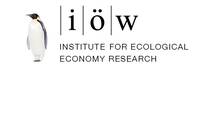Work Package 5: Costs and Benefits of the Adaptation to Climate Change
Starting point
Work packages 3 and 4 assessed the impacts of climate change and of certain selected adaptation strategies on income and employment by means of economic modelling. These results were used in work package 5 in order to evaluate possible costs and benefits of climate change and adaptation strategies and to render them comparable.
Climate change - and this holds for adaptation measures as well - might impact not only on income and employment. Its consequences could affect diverse normative concerns: subjective attitudes like degrees of satisfaction or happiness with social states, but also valuable properties like biodiversity, social relationships (by migration pressure), health (by diseases’ spreading), security (by extreme weather events).
Usually, cost-benefit analyses either neglect the broad variety of affected normative concerns or they translate only a narrow selection of affected values into monetary values.

Objectives
This work package aimed at developing an alternative methodology for the integration of different normative properties into a cost-benefit analysis: the extended CBA. The project furthermore intends to apply the methodology in a case study on adaptation policy.
An extended CBA comprised not only an evaluation of market impacts of a measure to which market prices can easily be attached; it also included an evaluation of impacts of a measure on goods and services that are not traded on markets. The idea behind the extended CBA was to evaluate non-market goods and services based on different valuation theories: teleological approaches (preference-based welfarism, hedonism) as well as deontological theories (rights-based, capabilities approaches)
Approaches and Methodology
The main task in this work package consisted of an identification of indicators by which the valuation theories could be operationalized and be integrated into a CBA. This research was based mainly on literature review. Subject to the availability of data several case studies were conducted in which extended CBAs should be tested.
Since an extended CBA evaluates social states or actions in a diversity of normative “currencies” a ranking of social states or actions was only possible by the means of multi-criteria evaluation methods. The work package introduced them and discussed the advantages and disadvantages of their use.




